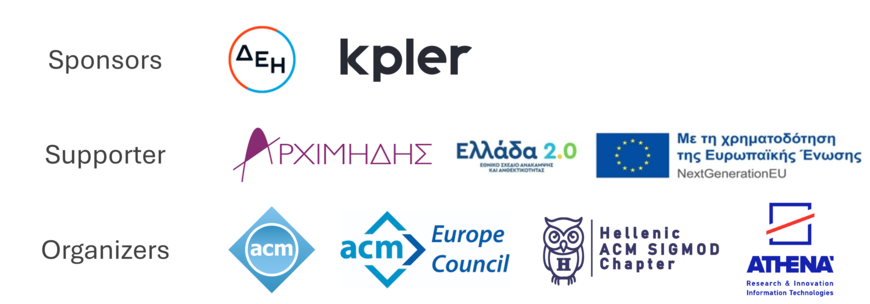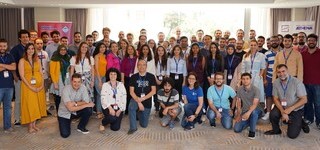Organizers & Committee
Committee
Alkis Simitsis
Alkis Simitsis is a Research Director at Athena Research Center and an IEEE Senior Member. In the past, he held various positions with HP/HPE Labs, Micro Focus, Unravel Data, and IBM Research, including Chief Scientist, Systems Architect, and Principal Research Scientist. Alkis brings 18+ years of critical experience in both startup and corporate environments, building innovative information and data management solutions and enterprise-grade products in areas such as scalable big data infrastructure, data-intensive analytics, information management, business intelligence, data warehouses, massively parallel processing, distributed databases, column-store databases, graph databases, security analytics, and cloud computing. Alkis holds 44 U.S. patents, 1 European patent, and has filed 50+ patent applications in the U.S. and worldwide, has published 110+ papers in refereed international journals and conferences (top publications cited 6800+ times, h-index: 44), and frequently serves in various roles in organization and program committees of top-tier international scientific conferences. His most recent service includes PC co-chair for EDBT/ICDT 2025, vice chair for IEEE Big Data 2023, area chair for IEEE ICDE 2023, associate editor for PVLDB 2023, ACM/IMS J. of Data Science, and Elsevier DKE, and rapid response reviewer for SIGMOD 2024. Alkis is a recipient of the ACM DOLAP 2023 Test-of-Time Award, several best demo paper awards (ACM CIKM 2020, ACM SIGMOD 2014 and 2012) and service awards (IEEE ICDE 2023, EDBT 2023, ACM SIGMOD 2021).
Georgia Koutrika
Georgia is an ACM Senior Member, and IEEE Senior Member. She is a member of the VLDB Endowment Board of Trustees, and the PVLDB Advisory board. She is co-EiC for VLDB Journal, PC co-chair for VLDB 2023, co-EiC of Proceedings of the VLDB (PVLDB). Georgia has received several awards, including recently the EDBT 2023 Test-of-Time award. She was general chair for ACM SIGMOD 2016, and she has served in various other organization roles, including EDBT 2023 and ICDE 2021 sponsorship chair. She has served or serves as associate editor for top conferences (such as ACM SIGMOD and VLDB) and journals (TKDE, VLDB Journal), as well as in various organization roles. She is the chair of ACM Europe Working Group on Seasonal Schools, and a member of the ACM-RAISE Working Group.
Minos Garofalakis
Minos Garofalakis is the Director of the Information Management Systems Institute (IMSI) at the ATHENA Research Centre in Athens, Greece, and a Professor at the School of Electrical and Computer Engineering of the Technical University of Crete (TUC), where he also directs the Software Technology and Network Applications Laboratory (SoftNet). He received his PhD in Computer Science from the University of Wisconsin-Madison in 1998, and has held positions as a Member of Technical Staff at Bell Labs, Lucent Technologies (1998-2005), as a Senior Researcher at Intel Research Berkeley (2005-2007), and as a Principal Research Scientist at Yahoo! Research (2007-2008). In parallel, he also held an Adjunct Associate Professor position at the EECS Department of the University of California, Berkeley (2006-2008). His research interests are in the broad areas of Big Data analytics and large-scale Machine Learning. He has published over 180 scientific papers and is an inventor on 36 US Patent flings (29 patents issued) for companies such as Lucent, Yahoo!, and AT&T. GoogleScholar gives over 15,000 citations to Prof. Garofalakis's work, and an h-index value of 66. He is an ACM Fellow (2018) and an IEEE Fellow (2017) for contributions to data analytics, and a recipient of the TUC Research Excellence Award (2015), the Bell Labs President's Gold Award (2004), and the Bell Labs Teamwork Award (2003).
Organization
Eleni Sotiropoulou, Athena Research Center
Giannis Altanopoulos, Athena Research Center
Tasos Patrikakos, Athena Research Center
Lydia Themeli, Athena Research Center
Mike Xydas, Athena Research Center
Organizers
ACM
ACM brings together computing educators, researchers, and professionals to inspire dialogue, share resources, and address the field’s challenges. As the world’s largest computing society, ACM strengthens the profession’s collective voice through strong leadership, promotion of the highest standards, and recognition of technical excellence. ACM supports the professional growth of its members by providing opportunities for life‐long learning, career development, and professional networking.
Founded at the dawn of the computer age, ACM’s reach extends to every part of the globe, with more than half of its 100,000 members residing outside the U.S. Its growing membership has led to Councils in Europe, India, and China, fostering networking opportunities that strengthen ties within and across countries and technical communities. Their actions enhance ACM’s ability to raise awareness of computing’s important technical, educational, and social issues around the world.
ACM Europe Council
The ACM Europe Council aims to increase the level and visibility of ACM activities across Europe. The Council is comprised of European computer scientists committed to fostering the visibility and relevance of ACM in Europe, and is focused on a wide range of European ACM activities, from high-quality ACM conferences in Europe, to expanding ACM chapters, to encouraging greater participation of Europeans in all dimensions of ACM.
Athena Research Center
The "Athena" Research and Innovation Centre in Information, Communication and Knowledge Technologies (ARC) is one of the leading research centers in Europe. It serves the full spectrum of the research lifecycle, starting from basic and applied research, continuing on to system & product building and infrastructure service provision, and ending with technology transfer and entrepreneurship. The fundamental role of ARC is to build knowledge and devise solutions and technologies for the digital society. Its value lies in the unique collection of skills and know-how of its researchers and professional staff and its national and international reputation. ARC comprises three institutes and five units. The institutes cover vibrant areas of digital technology and the units incubate know-how development activities that may lead to new major development directions. The institutes are: Institute for Language and Speech Processing (ILSP), the Industrial Systems Institute (ISI), and the Information Management Systems Institute (IMSI). The units are: Corallia - Hellenic technology cluster initiative, Space programmes (SPU), Robot perception and interaction (RPI), Environmental and networking technologies and applications (ENTA), and Pharma - Informatics.

Participate

Courses

Venue

Organizers & Committee
